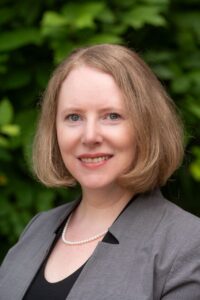 Hometown: Edwardsville, Illinois
Hometown: Edwardsville, Illinois
Current Position: Associate Professor of Political Science, Southern Illinois University Edwardsville
Professional Interests: Ukraine, Revolution of Dignity, Russia’s war crimes in Ukraine, political regimes
Dr. Wilson is the President of the American Association for Ukrainian Studies. She received her Ph.D. from the University of Washington, was a visiting scholar at the Harvard Ukrainian Research Institute (HURI) in 2015, and taught at the Harvard Ukrainian Summer Institute (HUSI) in 2017 and 2019. She was a Jerome Hall Postdoctoral Fellow at the Center for Law, Society and Culture at the Indiana University Maurer School of Law in 2012-2013. Dr. Wilson has provided analysis and commentary for broadcast and print media outlets regarding the Russian invasion of Ukraine, and the atrocities committed by the Russian forces. In May 2022, she was an invited lecturer for the online Invisible University for Ukraine, organized by the Central European University Budapest for Ukrainian students affected by the Russian invasion. In October of 2023, she was a Visiting Fellow at the Weizenbaum Institute in Berlin.
Why did you decide to join the Shevchenko Scientific Society?
It is an honor to be a part of this vibrant intellectual community, and it is exciting to meet and communicate with scholars who study different facets of Ukrainian history and culture.
What do you value about membership in the Society?
At a time when Ukraine is facing existential threat, it is truly inspiring to meet those who are devoted to the study of Ukraine and Ukrainians. It gives hope. There were so many fascinating events held by the Society… I think my favorite was Women and Russia’s War on Ukraine (March 14, 2022) – a discussion by Ukrainian, American, and Australian scholars about the remarkable contribution of Ukrainian women to the resistance against the invasion, and their courage despite ongoing atrocities committed by the Russian army.
How did your interest in Ukrainian culture and society influence your career path?
I’ve studied the post-Soviet world for a long time, but became especially fascinated by Ukrainian resistance during the Revolution of Dignity. My forthcoming book, Maidan: Ukraine’s Democratic Revolution, is a years-long study of events. Interviewing the revolutionaries about their participation in the protests, court battles, and logistical operations to feed, house and offer medical aid to the participants, transformed my understanding about the power of civil society. As activists debated means of resistance in the bitter cold of the protest square, they solidified a new understanding of democracy, one necessitating constant social oversight of state functions. As they fought against the unlawful detention of protesters in courts, they asserted new boundaries of state-society relations, engaging the concept of inalienable rights.
What is your current research/work project?
I am currently working on a new book project, comparing three occupations of Ukraine: by Nazi Germany, the Soviet Union and modern Russia. While we still debate the meanings of fascism and communism, I believe the essence of totalitarian regimes can be exposed through their occupational tactics.
What career advice would you give for new members of the Shevchenko Scientific Society?
Remember to take walks. Nature heals and inspires.
